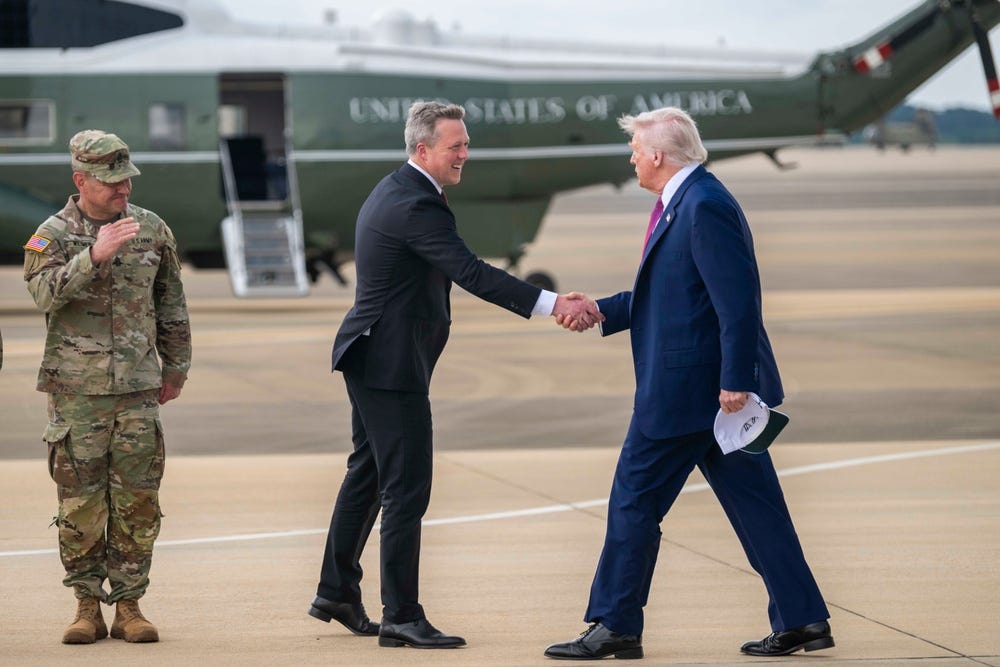Palantir, META, and OpenAI Executives Are Now Lieutenant Colonels in the U.S. Army
Four Silicon Valley executives were given rank, clearance, and command without ever serving.
While most of the country was watching Israeli missiles fall over Tehran, the U.S. Army quietly swore in four Silicon Valley executives as Lieutenant Colonels. Not as consultants. Not as contractors. As officers. In uniform. With rank and clearance.
That happened on June 13, 2025. You didn’t hear about it because you weren’t supposed to.
They call it Detachment 201.
A reference to an HTTP code for “resource created.” It sounds clever until you realize what that really means. The Army didn’t just create a unit. It created a doorway. A way in.
The generals know their war machine is aging. Their contractors are sluggish. Their procurement is broken. So they went outside. They recruited men who already design the tools of control. The ones who build the platforms we live on. The ones who run the algorithms that track our choices. The Army gave them uniforms and called it modernization.
The Legal Loophole That Let It Happen:
This didn’t come from nowhere. In 2019, Congress passed a quiet little clause tucked inside the National Defense Authorization Act. It gave the military power to directly commission civilians in “specialized” fields.
That was supposed to mean doctors. Lawyers. Cybersecurity officers. But we all know how the Trump Administration loves to skirt on the borders of the law.
Now it means the Chief Technology Officer of Palantir. The Chief Product Officer of OpenAI. The Army is calling Detachment 201 a commissioning pathway. Like it’s just another job title.
The commissioning ceremony was personal. It was overseen by Army Secretary Daniel Driscoll and Chief of Staff General Randy George. Not some paper pusher. These are the men who know exactly what this means. This is not a temporary trial. This is the first brick in a new foundation.
Daniel Driscoll is a known Trump loyalist, as he was picked by Trump to be the Secretary of the Army in his second administration. He was confirmed by the Senate and sworn into this role on February 25, 2025. Trump publicly stated that he selected Driscoll to be a "disruptor and change agent" at the Pentagon and "a fearless and relentless fighter for America's Soldiers and the America First agenda."
Driscoll also has a connection through Trump's running mate and now Vice President, JD Vance, as Driscoll served as a senior advisor to Vance. He was also appointed by Trump as the Acting Director of the Bureau of Alcohol, Tobacco, Firearms and Explosives (ATF) on April 10, 2025.
Who They Brought In:
Meet the first four members of Detachment 201. These are not your average reservists.
Shyam Sankar is the Chief Technology Officer at Palantir. His company builds predictive policing software and battlefield surveillance tools. It has massive contracts with the Department of Defense. Now he wears the uniform too.
Andrew Bosworth is the Chief Technology Officer at Meta. He oversees augmented reality, virtual reality, robotics, and more. His team is developing the next generation of soldier tech. Now he gets to advise the Army on how to buy it.
Kevin Weil is the Chief Product Officer at OpenAI. He used to run product at Twitter and Instagram. He knows how to build fast, scale faster, and manipulate user behavior through code. Now he is applying that logic to military systems.
Bob McGrew is a machine learning researcher and former Chief Research Officer at OpenAI. He now advises Thinking Machines Lab. His job is to train the models that make decisions without human oversight.
Each of these men is a multimillionaire. Each still holds a private job. None went through traditional officer training. And yet each now holds the rank of Lieutenant Colonel in the U.S. Army.
There is a quote that should be printed on the walls of Detachment 201’s command center if they had the honesty to hang it.
In 2009, Peter Thiel wrote, without shame:
"I no longer believe that freedom and democracy are compatible."
He wasn’t misquoted. He meant it.
Thiel called democracy a bottleneck. A drag. An obstacle to progress. He suggested that if liberty, as he defines it, is to survive, it must be liberated from voting, from institutions, from the people. He pitched technology as the great escape. A way to route around the will of the masses and put power directly into the hands of those “smart” enough to wield it.
In other words, Peter Thiel believes we’re all too stupid for democracy to work, and the world should be controlled by the rich and worthy. So, a call for a dictatorship.
That ideology is not fringe anymore. It is the beating heart of Detachment 201.
Because who sits inside this new “innovation corps”? Executives from Palantir, the company Thiel co-founded and shaped in his own image. A firm built on mass data surveillance, predictive policing, and battlefield analytics. A company that has profited off war, incarceration, and digital control while staying private enough to avoid accountability.
The Cosplay Clause:
The Army didn’t make them earn it.
No fitness test. No boot camp. Just a two week online and in person course called “boot camp lite.”
Some PowerPoint slides. Some flag etiquette. A tour of Fort Benning. They are not expected to command troops. Their value lies elsewhere.
Their job is to inject the Army with commercial tech logic. Software deployment cycles applied to battlefield hardware. They are here to reshape the Army’s bones. Not just its weapons.
The Army calls this “fusing innovation with operational capability.”
What it really means is outsourcing doctrine to CEOs.
This isn’t about helping the Army buy better tools and Detachment 201 is not just hiring advisors. It is embedding private capital inside the military chain of command. The generals want access to the latest tech before anyone else. They are tired of the delays. Tired of red tape. So they are skipping the line. They are creating a fast lane for corporate minds. Not as contractors. As officers. As insiders.
Palantir and the rest of Silicon Valley do not need to lobby the military if they are the military.
Conflict of Interest is Baked In:
This isn’t theoretical.
Palantir has active contracts with the Army and the Pentagon. It builds the Maven AI system and is designing battlefield data platforms. Meta builds augmented reality headsets for soldiers. OpenAI is building models for national security applications.
Now their senior executives are inside the room when the Army decides what to buy.
The Army says it has “firewalls” in place but these men are not separated from their firms. They still work there. Their allegiance is divided. Their compensation is private. Their power is public.
The Army is calling this a new model of national service. A way for private citizens to serve their country without leaving their careers. It sounds noble but it’s a redefinition of service. One that replaces sacrifice with influence. One that swaps out shared hardship for personal access. One that turns the military into a consulting client for the world’s most powerful companies.
This is not about patriotism. This is about control. It is about folding the private surveillance state into the public war machine.
It is about handing over the future of national defense to men whose business models depend on tracking, profiling, predicting, and monetizing human behavior.
This Is A Template, Not a Test:
The Army is already calling Detachment 201 a prototype. If it works, they will expand it. Bring in more executives. More companies. More fields.
This will not stay confined to the Army. The Navy and Air Force are watching. The Department of Homeland Security is watching. Intelligence agencies are watching.
If this becomes normal, the line between war and business will dissolve. The decisions that shape global conflict will be made not in Congress but in private meetings with commissioned officers who still answer to shareholders.
Detachment 201 is not reform. It is absorption.
The U.S. military has decided that to survive the next generation of warfare, it must become indistinguishable from the tech sector and the tech sector, in turn, is more than willing to wear a uniform if it means gaining more power and more control.
This is not a conspiracy theory. It is a matter of public record.
They have already taken the oath. The only question now is whether anyone will hold them accountable.
Note From The Author:
I don’t put my work behind a paywall. These stories are too urgent, too raw, too real to keep locked away.
But independent journalism takes time, risk, and resources. If you value reporting that doesn't flinch, that names names and shows receipts, please consider subscribing.
To stay in the loop, you can subscribe for free. It helps build awareness and keeps the pressure on but a paid subscription helps me keep digging, filing FOIAs, verifying sources, and staying on the story long after the headlines fade.
I’m not part of the mainstream press. I won’t sanitize what’s happening. I’ll just tell it like it is.
Thank you for being here.
— Dissent ♥









19 USC 603 gives Trump authority to give anyone Military Officer Grade in the time of am Emergency. Now you know why he declared an Emergency because of L.A.
We are truly screwed with this combination of tech bros and military. No wonder they tried to hide it. Thanks for this reporting.